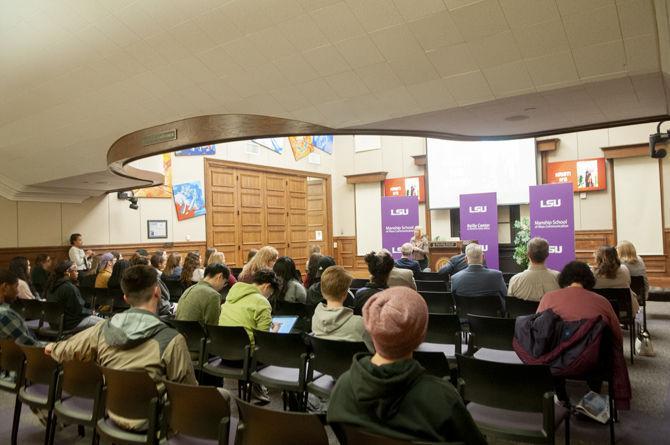Kristin Gilger, co-author of the book “There’s No Crying in Newsrooms,” shared what she’s learned about workplace barriers female journalists face with LSU students on Thursday. The event was sponsored by the Reilly Center for Media and Public Affairs and moderated by mass communication senior Kennedi Landry, who’s also a sports reporter at The Reveille.
Men have dominated the news industry since it began, Gilger said. While there has been growth over the years, the change has not been significant enough.
“If you asked Julia [Wallace, co-author] and me back when we were starting our careers if we thought we would be having this talk in 2020, we would have laughed” Gilger said. “Progress is being made; we just thought it would have been much farther by now.”
While Gilger never expected to write a book or have these conversations, talking about women’s success in media and other male-dominated industries has become something she is very passionate about. She is able to share many amazing stories of women fighting for their place with her students and two daughters.
“This was very natural because I lived it, and I know so many other women who lived through this,” Gilger said. “I just knew they had these amazing stories to tell and great wisdom to pass on, so it developed out of experience.”
In her talk and her book, Gilger shared the experiences of several different women working in media. Everyone that she talked to had something to say about the topic.
“Once we got them talking, we couldn’t get them to stop,” Gilger said.
Christiane Amanpour, a journalist currently working as CNN’s chief international anchor, shared with Gilger how even though she acts just as a man would, she treated differently for it and is called a “bitch.” This was not the only story shared with Gilger about power struggles within their field; it is a problem woman have encountered across the board, Gilger said.
Women feel constricted in leadership styles, Gilger said. If a woman is top tough, she is “bitchy” and if she is too soft, she is “wimpy.”
This portion of Gilger’s talk particularly resonated with management freshman Morgan Bourgue.
“I wasn’t surprised by anything she said, but the way she was approaching some of the issues were very interesting to me,” Bourque said. “One thing I have a problem with is my leadership style. I’m very prone to saying ‘sorry’ and feeling very weakened and diminished by the things I say. Hearing her say a lot about that really inspired me.”
While there is still a lot of progress to be made, some organizations are taking steps in the right direction. Places like Fox, Guardian and Mother Jones are some of the media organizations actively making changes to progress this ongoing struggle, according to Gilger.
“There are a lot of places that are intentionally working on these things, and I think that they are making progress. Is it as fast as I would like across the board? Well, no,” Gilger said. “But I feel very encouraged by your generation and by the millennials right in front of you because they are much less willing to put up and shut up. I think it’s your generation that will help things progress much more.”
One of Gilger’s biggest points was that people must speak up for change to occur.
“You need to speak up,” Gilger said. “Sometimes it’s easier to let things go, but that’s not enough. You need to speak up in civil, nice ways.”
As an example of a time women should assert themselves in the workplace, Gilger told a story about being one of few women in a news meeting and making a suggestion that fell on deaf ears. When a male journalist brought up a similar idea minutes later and everyone began to consider it, Gilger politely, but firmly, reminded the group that the idea was originally hers.
Click here to learn more about Gilger’s book, “There’s No Crying in Newsrooms.”
Kristin Gilger reminds LSU students there’s ‘no crying in newsrooms’ in Reilly Center talk
January 31, 2020
Kristin Grady Gilger talks about her book No Crying in the Newsroom on Thursday, Jan. 31, 2020 in the holiday forum in the Journalism building.









